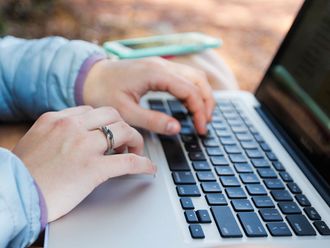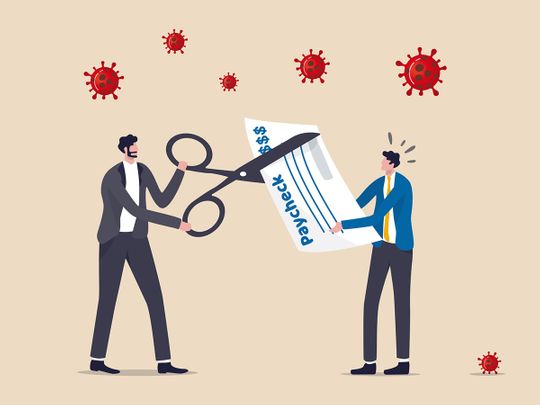
Immie Adshead, a freelance personal trainer in Dubai, has acutely felt the impact of the coronavirus pandemic on her earning potential. With a majority of her clients practising social distancing and staying at home, she has seen a significant reduction in the number of clients and people training.
“At the moment, what I am earning can barely cover my rent. Currently, I earn only 25 per cent of what I used to earn before the lockdown,” the British expat who has been in Dubai for three-and-a-half years told Gulf News.
75 %
Reduction in income as a result of COVID-19 lockdown
Before the lockdown, Adshead went to client’s houses, public parks and gyms to train them. A few of her existing clients have signed up to receive online training. “It takes a lot of time to build your reputation as a personal trainer and have a client base, but if you suddenly switch to online personal training, the results won’t be seen until a few months. I have been trying to get new clients online but it has been hitting a brick wall because of the economic uncertainty. A lot of people are saving their money for essentials like rent and food,” she added.

However, Adshead has some personal savings to sustain herself. Before the lockdown, she spent half her income on expenses and the other half went towards savings.
Minimal spend
“It’s important to have personal savings. Since I work as a freelance trainer, I minimise my expenses anyway as the income can be very unpredictable. You never have a guaranteed salary at the end of the month. You need to have a few months’ savings to live off in Dubai to tide over such difficult circumstances. That has been helping me now,” she explained.
You need to have a few months’ savings to live off in Dubai to tide over such difficult circumstances. That has been helping me now
Being a freelancer, Adshead always prefers to sign monthly contracts and not bind herself to long-term agreements. She pays monthly rent for an apartment in Dubai Marina. “At the moment, I wouldn’t want to move anywhere else. I pay monthly rent so that everything remains very dynamic. If I want to, I could downgrade to a smaller space or even upgrade to bigger premises. But at the moment, it’s status quo,” she added.
Adshead is also contemplating giving up her monthly car rental. She pays Dh1,300 per month to lease the car. During her visits to supermarkets, she only pays with cash these days instead of swiping her card. “It’s very easy to swipe the card multiple times whereas when you pay cash, you feel you are handing over something of value.”
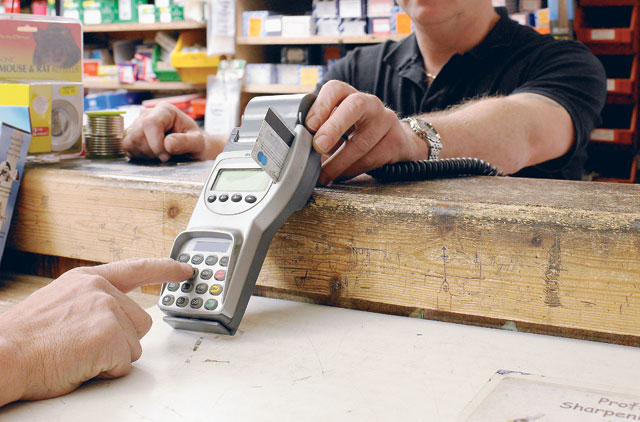
Supermarket savings
The personal trainer also sets aside money for her monthly food in a separate envelope. When she visits the supermarket every week, if she spends a quarter of that amount, she knows she is on track and if she spends beyond that sum, she knows she needs to be more careful the week after.
“I ask myself what’s important to spend on. Food shopping, house rent and the car rental are my main expenses. When I go food shopping, I ask myself whether the products I buy offer value, are healthy and whether I need them,” Adshead said.
Dh 1300
Average monthly expense to rent a car in Dubai
The British expat does not pay for gym membership and coaches herself instead. Since she works in the health industry, Adshead only invests in fitness equipment. “I already have an indoor bike trainer, a TRX, my dumbbells and also run, so I don’t need to buy anything else,” she added.
Saver, not spender
Adshead said she is more of a saver than a spender. She only spends money on fitness-related stuff and refrains from clothes shopping.
“I only spend money on things I get value from. If I were to spend money, it would mostly be on sport, cycling or race and track. Even when I went out with friends before the lockdown, I was careful about what I would spend on,” Adshead pointed out.
The personal trainer said the biggest lesson from the coronavirus pandemic is the importance to have awareness to manage finances effectively. “Be aware of what you are spending on. Ask yourself what is important to spend money on and rearrange your priorities to work out the best budget for yourself,” she remarked.
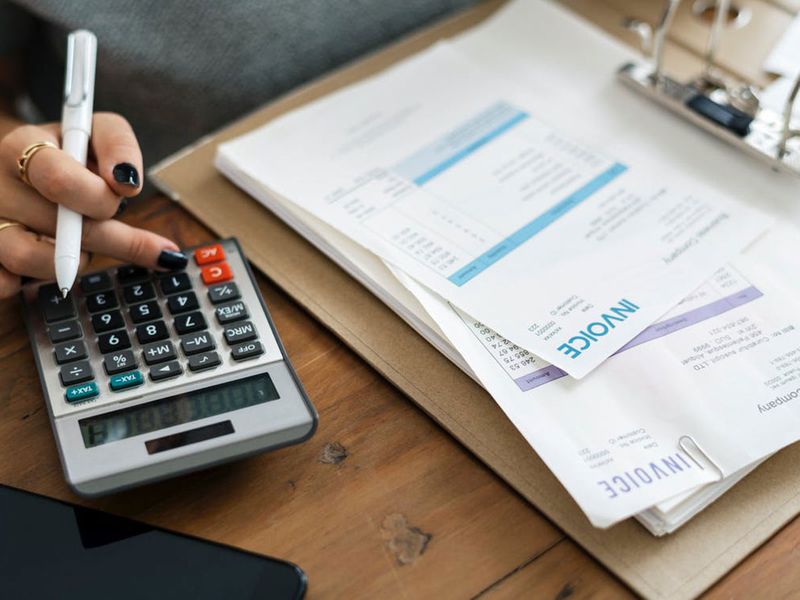
Unpaid leave hits family’s income
Anoop, who works at a digital marketing firm in Dubai, has been put on indefinite unpaid leave since the beginning of the lockdown. The Indian expat had only joined the firm in March when the coronavirus pandemic struck. However, the family is managing to tide over the situation since his wife works as well.
“Fortunately, my landlord has reduced our house rent by about Dh8,000. I was even planning to move to another emirate. My 4-year-old son’s school is planning to reduce fees as well. We have sent them a mail with all the relevant documents which proves we are facing a salary reduction. The next school fee is due in June. Most schools in Dubai have adjusted fees and offered discounts to parents. We are hoping to benefit too,” Anoop told Gulf News.
25-30 %
Reduction in income owing to COVID-19 outbreak
The family has faced a 25 to 30 per cent reduction in their income because of COVID-19.
No-frill lifestyle
Owing to the lockdown, the family doesn’t have to spend money for fuel. The parents cannot make adjustments to their grocery expenses with two children at home. “We follow a month-to-month budget these days. We don’t order a lot of food or do online shopping. We have very minimal expenses and spend only on essentials. It’s a no-frill lifestyle for now,” added Anoop.
The Indian expat who has been in Dubai for a decade said it’s difficult to save money with high rents and living expenses.
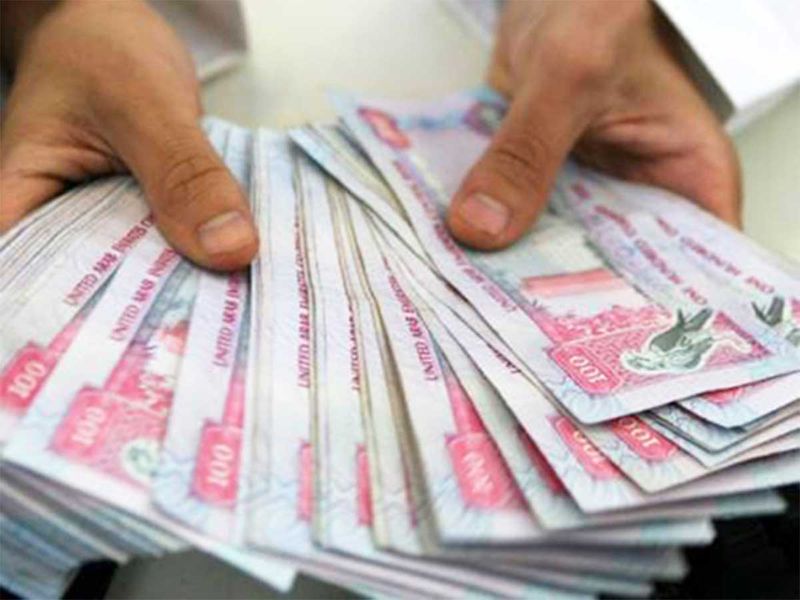
“Gone are those days when families used to remit big amounts of money to their home country or save. Families prefer to live together now, so expenses also go up. In previous years, only the husband worked in the UAE and kept his family in their home country. Majority of families here find it hard to set aside money for three months or a rainy day,” Anoop observed.
No payment holiday on loan
The family has a personal loan, but so far they have managed to pay the monthly installment promptly and have not requested for a payment holiday.
The biggest lesson from the COVID-19 outbreak is that one can survive on minimal things
Anoop admits to being a saver and only spends on his kids. Since he has been in and out of jobs in the past four years, it has taught the family to live minimally and be mindful of their expenses.
“I haven’t been extravagant on anything of late. The biggest lesson from the COVID-19 outbreak is that one can survive on minimal things. There is a cheaper alternative for everything. You can also use this time to teach yourself and your kids financial discipline,” he remarked.
Tips to manage your budget better
- Be mindful of what you are spending on
- Cut down on non-essential items
- Pay with cash, don’t swipe your card at the supermarket
- Set aside monthly budget for food shopping; stick to it
- Request for rent relief from your house landlord, supported by evidence of income reduction
- Request for discounts on children’s school fees
- Order less from outside, try home cooking more often
- Have savings worth 3 to 6 months' expenses






